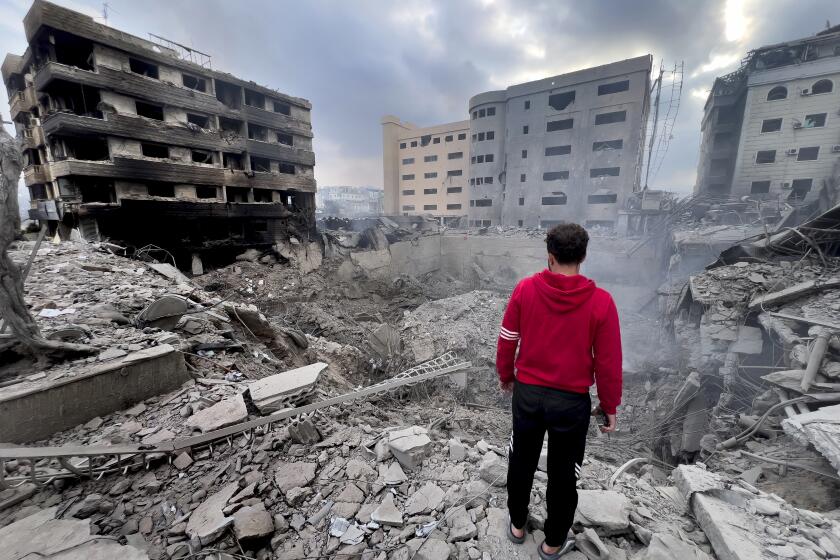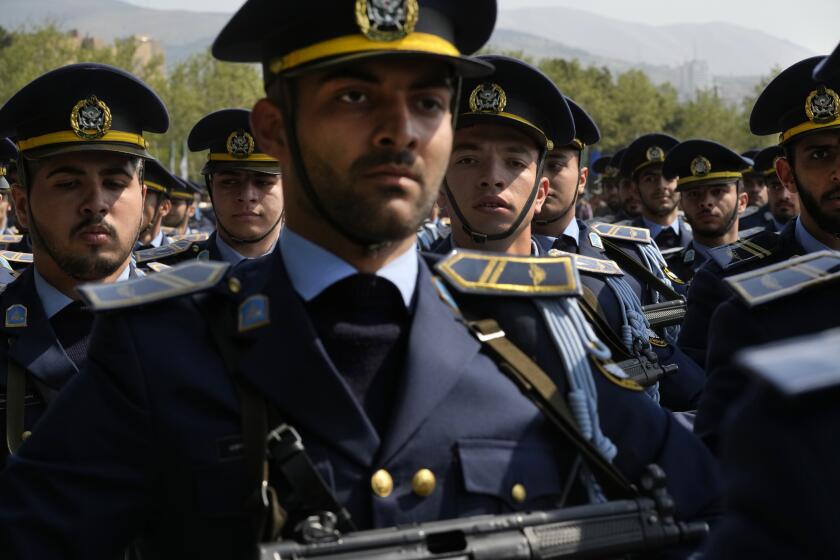Israel bombards north Gaza; U.N. peacekeepers in Lebanon are hit again

BEIRUT — Palestinians in northern Gaza described heavy Israeli bombardment Saturday in the hours after airstrikes killed at least 22 people, as Israel continued to tell people there and in southern Lebanon to get out of the way of its offensives against the Hamas and Hezbollah militant groups.
In Lebanon, the United Nations peacekeeping force said its headquarters in Naqoura had again been hit, with a peacekeeper struck by gunfire late Friday. It wasn’t clear who fired. The shooting occurred a day after Israel’s military fired on the headquarters for the second straight day. Israel, which has warned the peacekeepers to leave their positions, didn’t immediately respond to questions.
Hunger warnings emerged again as residents in northern Gaza said they hadn’t received aid since the beginning of the month. The U.N. World Food Program said no food aid had entered the north since Oct. 1. An estimated 400,000 people remain there.
Israel’s military renewed its offensive in northern Gaza almost a week ago while escalating its air and ground campaign against the Iran-backed Hezbollah in Lebanon.
Lebanon’s state-run National News Agency said an Israeli airstrike hit an apartment building in the Zarout coastal area on the edge of Barja south of Beirut, and the Health Ministry said four people were killed. The ministry said another airstrike on the village of Maisra northeast of Beirut killed five.
The toll in Lebanon over the last year of conflict between Israel and Hezbollah is now 2,255 killed, according to the Lebanese Health Ministry, with more than 1,400 slain since mid-September. It wasn’t clear how many were fighters. More than 1 million people have been displaced in Lebanon.
Hezbollah critics and supporters alike are voicing frustration over what many view as the group’s miscalculations.
Israel’s military said that Hezbollah fired more than 300 projectiles over the Yom Kippur holiday and said that it killed 50 militants in Lebanon. Claims on either side couldn’t be verified.
“We will keep standing with the Lebanese people during these difficult circumstances and also with the Palestinian people,” the speaker of Iran’s parliament, Mohammad Bagher Qalibaf, said Saturday while touring the scene of an Israeli airstrike in Beirut.

Amid Israel’s war with Hezbollah, top U.N. official Carl Skau told the Associated Press that he’s concerned that Lebanon’s ports and airport might be taken out of service, with serious implications for getting food supplies into the country.
Skau noted that food prices have already increased because of the conflict, although Lebanon’s sole international airport and its main sea ports are still functioning. The World Food Program had stocked up enough food to supply 1 million people — about one-fifth of Lebanon’s population — for up to a month, he said, but now is trying to build up supplies that could feed that number through the end of the year.
“We will, of course, be having to restock, and for that, the ports will be critical and other supply lines,” he said.
Skau said he believes that Israeli authorities had given “commitments” that in Lebanon, the ports and airport would not be taken out of commission.
“But of course, this is a very changing environment. So we don’t take anything for granted,” he said.
Gaza residents are trapped
In northern Gaza, residents told the Associated Press many were trapped in their homes and shelters with dwindling supplies while seeing bodies uncollected in the streets as the bombing hampered emergency responders.
Those who rushed to the scene of the latest deadly airstrikes in the urban refugee camp of Jabaliya found a hole 65 feet deep where a home once stood.
Here’s a look at the so-called Axis of Resistance, an Iran-backed coalition including Hezbollah, Hamas and other militant groups devoted to destroying Israel.
At least 20 bodies were recovered as of Saturday morning, while others likely were trapped under the rubble, emergency service officials said. Elsewhere in Jabaliya, a strike on a home killed two brothers and wounded a woman and newborn baby, the officials said.
Another strike in the afternoon hit a Jabaliya home and killed at least four people including a woman, said Fares Abu Hamza, an official with the emergency service.
Israel’s military said that it killed more than 20 militants in the Jabaliya area over the last day.
Military spokesperson Avichay Adraee told people in parts of Jabaliya and Gaza City to evacuate south to an Israeli-designated humanitarian zone as Israel plans to use great force “and will continue to do so for a long time.”
Israel has repeatedly returned to parts of Gaza as Hamas and other militants regroup. The war has destroyed large areas of Gaza and displaced around 90% of its population of 2.3 million people, often multiple times.
Once again, some families moved south on foot, in donkey carts or crowded in vehicles that navigated piles of rubble. Others refused to go.
“It’s like the first days of the war,” Jabaliya resident Ahmed Abu Goneim said. “The occupation is doing everything to uproot us. But we will not leave.”
The 24-year-old said Israeli warplanes and drones struck many neighboring houses in the last week, He counted 15 relatives and neighbors, including four women and five children as young as 3, killed in neighboring homes. He said there were dead in the streets, and “no one is able to recover them because of the bombing.”
Hamza Sharif, who stays with his family in a school-turned-shelter in Jabaliya, described “constant bombings day and night.”
He said the shelter has not received aid since the beginning of the month.
“Families depend on what they have stored, but they will run out of supplies very soon,” he said.
Food is running out
The World Food Program said it was unclear how long the limited food supplies it distributed in northern Gaza earlier will last.
The U.N.’s independent investigator on the right to food last month accused Israel of carrying out a “starvation campaign” against Palestinians, which Israel has denied.
Israel’s offensive in Gaza started after Hamas’ Oct. 7 attack, when militants stormed into Israel, killing some 1,200 people, mostly civilians, and abducting around 250 others.
Israel’s offensive has killed more than 42,000 Palestinians, according to the Gazan Health Ministry. Its numbers do not differentiate between combatants and civilians, but officials say at least half of the victims are women and children. The ministry said hospitals had received the bodies of 49 people killed over the last day.
Associated Press writers Mroue reported from Beirut, Magdy from Cairo. AP writers Jack Jeffery in Jerusalem and Sam Metz in Rabat, Morocco, contributed to this report.
More to Read
Sign up for Essential California
The most important California stories and recommendations in your inbox every morning.
You may occasionally receive promotional content from the Los Angeles Times.












